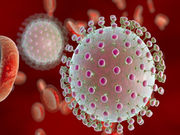Study authors unsure if virus can harm human fertility
WEDNESDAY, Feb. 22, 2017 (HealthDay News) — The Zika virus causes the testes of mice to shrink, according to an experimental study published in the Feb. 22 issue of Science Advances.
Because Zika can be transmitted through semen, researchers hypothesized that the virus might replicate in the testicles, lead author Ryuta Uraki, Ph.D., a postdoctoral associate with the Yale University School of Medicine in New Haven, Conn., told HealthDay. To test this, Uraki and his colleagues infected male mice with Zika and monitored the presence of the virus in different cell types.
The researchers found that even after Zika disappeared from the blood, the virus continued to replicate in Leydig cells. The researchers also found high levels of Zika genetic material in the epididymis. After 21 days, the testicles of Zika-infected mice had become significantly smaller than those of uninfected control mice, indicating progressive testicular atrophy. A reduction in serum testosterone was found to be the result of Zika infection, suggesting that male fertility can be affected.
“Our findings have important implications for nonvector-borne vertical transmission, as well as long-term potential reproductive deficiencies, in Zika virus-infected males,” the authors write.
Copyright © 2017 HealthDay. All rights reserved.








